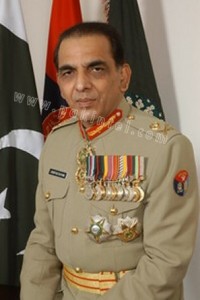UN probe indicts Pak Army, ISI

According to the report“ the bulk of the anti-Indian activity was and still remains the work of groups such as Lashkar-e-Taiba, which has close ties with the ISI. A common characteristic of these jihadi groups was their adherence to the Deobandi Sunni sect of Islam, their strong anti-Shia bias, and their use by the Pakistani military and intelligence agencies in Afghanistan and Kashmir.
A no less grave concern was the UN accusing the “Establishment“–the Army and ISI—of certain complicity in the assassination of Benazir. The report pointed out that “the Establishment was threatened by the possibility of Ms Bhutto’s return to high public office and that it was involved in or bears some responsibility for her assassination.“ The report accused those `elements` within the army and ISI who retained “links with radical Islamists, especially the militant jihadi and Taliban groups and are sympathetic to their cause or view them as strategic assets for asserting Pakistan’s role in the region.“ The UN cited the testimony of several former intelligence officials who said the agency had severed its ties with terrorist groups in 2007, “virtually all independent analysts provided information to the contrary and affirmed the ongoing nature of many such links.“
Although the report has not accused any one in the conspiracy, a firm finger is pointed at former President, Pervez Musharraf who, it said, was clearly threatened by the return of Benazir to Pakistan. The report said “Ms Bhutto also emerged as a potential threat for General Musharraf, as she increasingly challenged his plans to maintain his hold on power, first by returning to Pakistan to campaign, then by focusing on the potential for election rigging, and finally by campaigning directly against the military dictatorship during the weeks of martial law.“
Interestingly, another person named in the report is a close confidante of Musharraf, retired Brigadier Ijaz Shah. Shah was accused by Benazir of conspiring to kill her. Shah, who retired as the head of ISI’s provincial headquarters in Lahore, handled terrorist groups like Jaish-e-Mohammad and Harkat-ul Jihad al Islami (HuJI). Shah was appointed as the Director of Intelligence Bureau after Musharraf took over the reigns of power in a coup in October 1999. Shah’s main responsibility was to keep a tab on Musharraf’s opponents—he had in fact threatened a woman lawyer who represented a rape victim, Muktar Mai, who vigorously campaigned against Musharraf for protecting the people who raped her. Shah’s links with terrorist groups came out into the open after JeM leader Syed Omar Sheikh, accused of masterminding the killing of American journalist, Daniel Pearl in January 2002, surrendered to him at his house. Sheikh remained with Shah for a few days before Musharraf made his arrest public at a press conference in Washington.
The report, however, failed to account another of Musharraf’s crony in the agency, Brigadier Riaz ul Chibb. He was named by Benazir in one of her emails to her friends and supporters which mentioned threats to her life after she returned to Pakistan in October 2007. Chibb,who happened to be Shah’s friend, was reemployed by Musharraf and tasked to manipulate the elections which Musharraf was forced into holding in 2007. Chibb was the handler of LeT, dealing directly with the terrorist group’s operational commander, Zaki-ur Rahman Lakhvi. Both Shah and Chibb are part of Shadow ISI cell operating under ISI’s Directorate S.
The report points out the alliance between ISI and HuJI chief Qari Saifullah Akhtar. Akhtar, advisor to the Taliban chief Mullah Omar, worked as ISI’s liaison man with the Taliban and al Qaida. His links to Osama bin Laden were well known and his deputy, Illyas Kashmiri, a former Pak Army commando, had worked as an advisor to Laden’s deputy Ayman al Zawahiri. Akhtar was one of the persons, along with a group of Army officers, who had attempted to overthrow the first Benazir Bhutto government in 1995. Akhtar had escaped to Pakistan and then to Dubai after the US bombing of the al Qaida/Taliban hideouts following the 9/11 attacks. He was subsequently extradited from Dubai to Pakistan under the US pressure where he was kept under detention for sometime and freed. Akhtar was released when present Army chief, General Ashfaq Kayani, was the ISI chief.
(courtesy: www.poreg.org)
-
Book Shelf
-
 Book Review
DESTINY OF A DYSFUNCTIONAL NUCLEAR STATE
Book Review
DESTINY OF A DYSFUNCTIONAL NUCLEAR STATE
- Book ReviewChina FO Presser Where is the fountainhead of jihad?
- Book ReviewNews Pak Syndrome bedevils Indo-Bangla ties
- Book Review Understanding Vedic Equality….: Book Review
- Book Review Buddhism Made Easy: Book Review
- Book ReviewNews Elegant Summary Of Krishnamurti’s teachings
- Book Review Review: Perspectives: The Timeless Way of Wisdom
- Book ReviewNews Rituals too a world of Rhythm
- Book Review Marx After Marxism
- Book Review John Updike’s Terrorist – a review
-
-
Recent Top Post
-
 Commentaries
Impasse over BRI Projects in Nepal
Commentaries
Impasse over BRI Projects in Nepal
-
 CommentariesNews
Yet another Musical Chairs in Kathmandu
CommentariesNews
Yet another Musical Chairs in Kathmandu
-
 CommentariesTop Story
Spurt in Anti-India Activities in Canada
CommentariesTop Story
Spurt in Anti-India Activities in Canada
-
 NewsTop Story
Nepal: Political Stability Under Threat Again
NewsTop Story
Nepal: Political Stability Under Threat Again
-
 NewsTop Story
Accountability Tryst With 2024 Ballot….
NewsTop Story
Accountability Tryst With 2024 Ballot….
-
 NewsTop Story
What Would “Total Victory” Mean in Gaza?
NewsTop Story
What Would “Total Victory” Mean in Gaza?
-
 CommentariesTop Story
The Occupation of Territory in War
CommentariesTop Story
The Occupation of Territory in War
-
 CommentariesTop Story
Pakistan: Infighting in ruling elite intensifies following shock election result
CommentariesTop Story
Pakistan: Infighting in ruling elite intensifies following shock election result
-
 CommentariesTop Story
Proforma Polls in Pakistan Today
CommentariesTop Story
Proforma Polls in Pakistan Today
-
 CommentariesTop Story
Global South Dithering Away from BRI
CommentariesTop Story
Global South Dithering Away from BRI
-
AdSense code




















